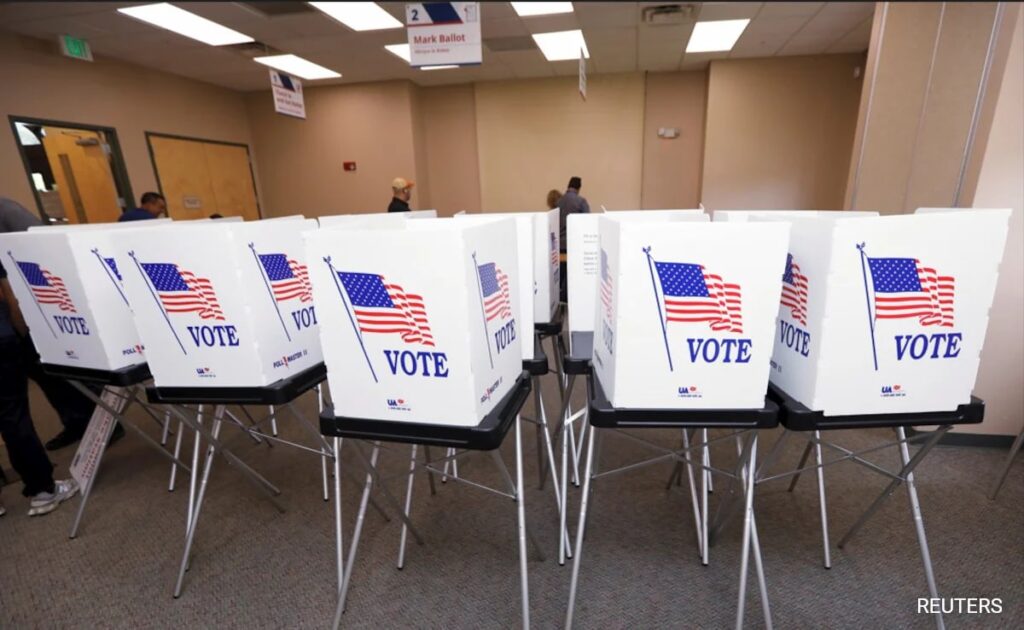Washington:
Abortion rights are perhaps the most important issue in the United States ahead of the November 5 presidential election. Abortion affects 50 percent of the U.S. population and is a matter of fundamental personal liberty, protected by the Fourteenth Amendment. US Constitution.
Donald Trump reformed the Supreme Court during his presidency, and in 2022 the Supreme Court will overturn Roe v. Wade, the federal government’s guarantee on abortion access, allowing states to determine their own abortion policies. I did it like that. This dismantles 50 years of precedent protecting abortion rights across the United States. us.
Abortion referendums are currently being held in at least 10 U.S. states, and the abortion question will appear on the same ballot that will be used to elect the next U.S. president.
This is the first US presidential election to take place after a landmark Supreme Court ruling banned or restricted access to abortion in much of the country.
The consequences could be significant, potentially overturning regulations that affect tens of millions of women. Democrats also hope the issue will rally a broader swath of voters in their favor.
Recently, women in the United States have been forced to cross state lines to terminate life-threatening pregnancies. “This is a health care crisis, and Donald Trump is the architect of it,” Kamala Harris said.
referendum
According to the Fourteenth Amendment to the U.S. Constitution, “all persons born or naturalized in the United States and subject to the jurisdiction of the United States are nationals of the United States and the state in which they reside; No law shall be enacted or enforced to deprive citizens of the United States of their privileges or immunities, nor shall any State deprive any person of life, liberty, or property, without due process of law. shall not deny to any person within its jurisdiction the equal protection of the laws. ”
The November referendum would require each constitutional amendment to enshrine state-level reproductive rights, which were undermined by a 2022 U.S. Supreme Court ruling that limited access to abortion.
Among the states affected by the U.S. Supreme Court’s restrictive abortion decisions, Arizona, Florida, Missouri, Nebraska, and South Dakota have held referendums.
Other states currently voting on abortion rights are Colorado, Maryland, Montana, Nevada, and New York.
What it means for these states
Arizona – Arizona, a key battleground state, currently limits abortions to 15 weeks of pregnancy. Democrats hope the referendum will improve their chances of winning in this key battleground state. Proposition 139, which is almost certain to be adopted, protects abortion up to the point where the fetus is viable.
Florida – This is the third most populous state in the United States. Currently, abortions are prohibited in the state after six weeks of pregnancy. This is a very short period of time, so women often realize that they are pregnant only after this period. Voters will choose on Nov. 5 whether to extend that period to the period of fetal viability (about 24 weeks of gestation). The amendment must receive 60 percent of the vote to pass. Recent polls show that 55% of Floridians support him, while 20% are unsure.
Missouri – The Midwestern state of Missouri has one of the strictest abortion bans in the United States, with no exceptions even in cases of rape or incest. The referendum proposes allowing abortion until the fetus is viable in the traditionally Republican state.
Nebraska – Abortion is legal up to 12 weeks in this state. The state is the only state in the nation to vote on two competing proposals. One would establish a “fundamental right” to abort until the fetus is viable, and the other would ban abortion after the first trimester (13 weeks). A winning amendment would require 50% of the vote, more votes than competing initiatives.
South Dakota – South Dakota, like Missouri, has a ban on abortion, allowing abortions only to save the mother’s life. Voters will now decide whether to reestablish the right to abortion during the first trimester of pregnancy.
Colorado – Colorado is one of the few states where abortion is legal without gestational age restrictions. Citizen-led initiatives are currently proposing constitutional protections for abortion rights in Democratic-led states.
Maryland – Maryland voters will decide whether to amend the constitution to enshrine the right to abortion until the fetus is viable.
Montana – A traditionally conservative state, abortion is legal in Montana until the fetus is viable, despite legal efforts to restrict access and blocked by judges. be. The proposed amendment would enshrine existing reproductive rights into the state constitution.
Nevada – Voters in western Nevada, where abortion is legal until the fetus is viable (24 weeks), will choose whether to enshrine that right in the state constitution.
NEW YORK – New York state lawmakers have introduced an amendment that would further strengthen access to abortion, which is already legal until the fetus is viable, and include anti-discrimination protections for reproductive health care.



